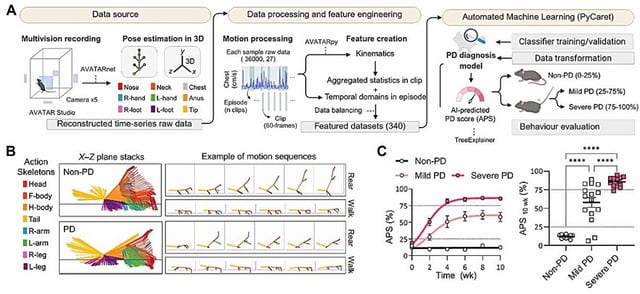Overview
- Researchers created an AI-predicted Parkinson’s score by analyzing more than 340 3D pose features, with scores separating from controls within two weeks of disease induction.
- Testing the metric in an ALS mouse model yielded low scores despite motor decline, indicating the measure tracks Parkinson’s-specific behaviors.
- Light-controlled optoRET activation of neurotrophic signaling improved gait and reduced tremor in the Parkinson’s model.
- An alternate-day light schedule produced the strongest treatment effects and showed a tendency to protect dopamine-producing neurons.
- The study was published August 21 in Nature Communications, and KAIST detailed the integrated preclinical pipeline in a September 22 announcement.

